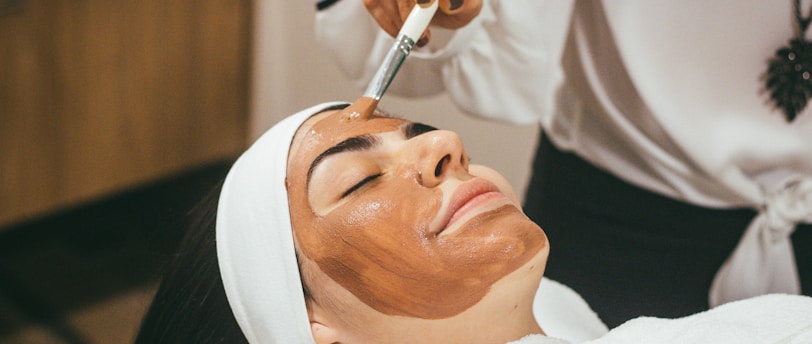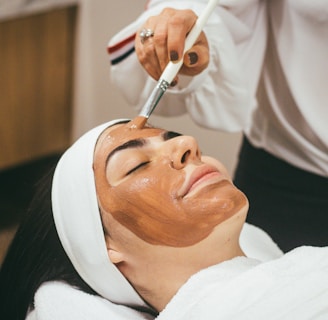New Customer Special Discount !!
Combat Acne with Professional Facials: Solutions and Home Care Tips
8/25/20244 min read


Understanding How Professional Facials Treat Acne
Professional facials offer a multifaceted approach to treating acne, leveraging various techniques and treatments that can effectively address the root causes of acne and improve overall skin health. One primary method is deep-cleansing, which involves thoroughly cleaning the skin to remove impurities and excess oils that can block pores and lead to breakouts. This is often followed by exfoliation—a process that sloughs off dead skin cells to promote cell turnover and prevent clogged pores.
An essential component of many facials is extractions. Conducted by trained professionals, extractions involve the safe removal of blackheads and whiteheads. This procedure reduces the chances of developing inflamed pimples and cysts, thus contributing to clearer skin. Specialized masks and serums are also integral; these products are tailored to the individual's skin type and specific acne issues. Masks can soothe inflammation and absorb excess oil, while serums often contain active ingredients like salicylic acid, benzoyl peroxide, and retinoids, which are known to combat acne.
In addition to these individual treatments, the cumulative effect of regular professional facials can significantly improve long-term acne management. Consistent treatments help in maintaining clean pores, reducing oil secretion, and providing ongoing exfoliation, all of which contribute to healthier skin over time. Regular facials also offer the benefit of professional guidance, allowing for the adjustment of skincare routines as needed and potentially recommending home care products that complement the in-clinic treatments.
Overall, the combination of deep-cleansing, exfoliation, extractions, and the application of targeted masks and serums makes professional facials a comprehensive approach to treating acne. These treatments not only target the immediate issues but also contribute to the long-term health and appearance of the skin, making them an invaluable tool in combating acne.
```
Different Types of Acne Treatment Facials
Professional facials offer a range of targeted treatments for acne-prone skin, each designed to address specific needs and skin conditions. By understanding the different types of acne treatment facials available, individuals can make informed decisions on the best approach to manage their acne effectively.
Deep-Cleansing Facials
Deep-cleansing facials are a popular choice for combating acne. These facials involve thorough exfoliation, extraction of blackheads and whiteheads, and the application of specialized masks. They help to unclog pores and remove impurities, which is crucial for reducing acne outbreaks. While highly effective, some individuals might experience temporary redness following the procedure. Therefore, this type of facial is best suited for those with mild to moderate acne.
Chemical Peels
Chemical peels use acids like salicylic acid or glycolic acid to exfoliate the outer layer of the skin. This treatment can significantly reduce acne symptoms by promoting cell turnover, thereby unclogging pores and diminishing acne scars. However, chemical peels can cause skin sensitivity and peeling in the days following treatment. It is essential to consult with a dermatologist before opting for this procedure, especially for those with severe acne or sensitive skin.
LED Light Therapy
LED light therapy utilizes varying wavelengths of light to treat acne. Blue light targets acne-causing bacteria, while red light reduces inflammation and promotes healing. This non-invasive treatment has minimal side effects and can be a powerful addition to any acne management regime. Suitable for all skin types, LED light therapy is particularly appealing to individuals seeking a gentler, yet effective, solution for persistent acne.
Microdermabrasion
Microdermabrasion is a form of exfoliation that removes dead skin cells from the surface, promoting improved skin texture and clarity. This treatment can help reduce acne scars and minor breakouts by smoothing the skin and enhancing the absorption of topical medications. Nevertheless, it may not be suitable for severe acne, and a consultation with a skincare professional is recommended to determine the appropriate frequency and intensity of the sessions.
When choosing the right facial treatment, it is crucial to consider factors such as the severity and type of acne, skin sensitivity, and any underlying skin conditions. Consulting with a skincare professional can ensure a personalized approach that effectively addresses individual concerns while minimizing potential side effects.
Essential Home Care Tips to Complement Professional Facials
To sustain the benefits achieved from professional facials, adopting a diligent home care routine is paramount. Consistency is crucial in maintaining clear and healthy skin. Use non-comedogenic products to prevent pore blockage, which can result in acne flare-ups. Opt for gentle cleansers that effectively remove impurities without stripping your skin of its natural oils. Look for options containing mild ingredients, especially if your skin is sensitive or prone to acne.
Strategically incorporating acne-fighting ingredients can amplify your results. Salicylic acid, an excellent exfoliant, helps to unclog pores and reduce acne lesions. Benzoyl peroxide, known for its antibacterial properties, targets and reduces Propionibacterium acnes, the bacteria responsible for acne. It's advisable to start with lower concentrations to test your skin’s tolerance before integrating these products fully into your regimen.
Moisturizing is a non-negotiable step in any skincare routine. Opt for lightweight, oil-free moisturizers that hydrate without clogging your pores. Ingredients like hyaluronic acid are superb choices as they provide hydration while improving skin texture.
It's imperative to avoid common acne triggers to maintain the progress made through professional facials. Steer clear of foods known to exacerbate acne, such as high-glycemic foods and dairy. Stress is another significant factor; incorporating stress-reducing activities such as yoga or meditation can positively impact your skin. Avoid touching your face unnecessarily, as this can transfer bacteria and oils, leading to breakouts.
Finally, general skincare habits play a significant role in complementing professional treatments. Ensure you're drinking ample water daily to support skin hydration. A balanced diet rich in fruits, vegetables, and lean proteins can also aid in achieving clearer skin. Prioritizing these home care tips will not only extend the benefits of your professional facials but also contribute to overall skin health.
Beauty
Enhance your beauty and wellness with our expert services
Contact
© 2019. Rymss Salon All rights reserved.
